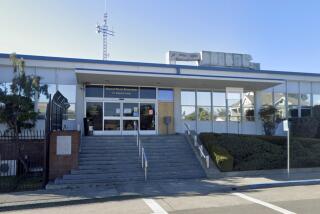Gates Says He Was a Model for LAPD Officers : Court: King’s lawyer tries to show that the former chief was ultimately responsible for the beating of his client. A dispute over use of Christopher Commission report cuts testimony short.
- Share via
Former Los Angeles Police Chief Daryl F. Gates testified for the first time Tuesday about his role as chief when Rodney G. King was beaten, portraying himself as a model for his troops, but his testimony was cut short after lawyers became embroiled in a legal dispute.
During Gates’ 20 minutes on the stand, King’s attorney, Milton Grimes, attempted to confront him about evidence of racism outlined in the Christopher Commission report in 1991.
Lawyers for the defendants named in the lawsuit immediately objected, arguing that the report was untrustworthy.
The dispute brought an abrupt end to Gate’s testimony Tuesday as U.S. District Judge John G. Davies sent the jury home to allow attorneys to debate whether the commission’s report should be entered into evidence. Davies asked the attorneys to present further legal briefs on the issue before Gates returns to the stand today.
Gates, probably the most affluent of the 15 defendants in King’s lawsuit, had several testy exchanges with Grimes as the former chief detailed his 43-year-career with the department.
Asked if he had tried to “set the tone” for the department, Gates said that was part of his job.
“The popular term is ‘the buck stops here,’ right?” Grimes asked.
“I was the chief of police,” said Gates, leaning forward with his mouth close to the microphone.
Grimes asked if Gates ever rode along with his officers while he was chief, and Gates replied that he had done so more than any other chief.
Asked if he was involved in setting up the Christopher Commission, Gates said he was not. Gates said the real name of the body was the Independent Commission.
‘Didn’t you refer to it as the Christopher Commission in your book?” Grimes asked.
The commission became known by the name of one of its leaders, Warren Christopher, a private attorney at the time who is now President Clinton’s secretary of state.
Through the questioning, King’s attorneys sought to show that Gates was ultimately responsible for the deeds of his officers.
The Christopher Commission investigated the LAPD in the wake of King’s beating and concluded in its report that racism, sexism and use of excessive force existed in the department. It criticized Gates’ leadership and ultimately led to his downfall.
King’s lawyers told the judge outside the jury’s presence that they wanted to show that Gates is liable for damages because he should have known about misconduct in his department and should have stopped it.
But Davies questioned how the commission’s report could be used to show that Gates would be held responsible for the actions of those under his command. He said that he would hold King’s attorneys to a strict and narrow standard to prove that Gates is personally accountable.
During the first phase of the trial, the jury awarded King $3.8 million in compensatory damages to be paid by the city. In the second phase, the 10-member panel is seeking to determine whether 15 individuals, including Gates, should pay punitive damages.
The March 3, 1991, beating led to criminal charges against four officers. Not-guilty verdicts in their state court trials set off three days of rioting in Los Angeles. In 1993, a federal jury convicted two of them, Laurence M. Powell and Stacey C. Koon, of violating King’s civil rights. Two others, Timothy E. Wind and Theodore J. Briseno, were acquitted but are defendants in the lawsuit.
More to Read
Sign up for Essential California
The most important California stories and recommendations in your inbox every morning.
You may occasionally receive promotional content from the Los Angeles Times.










